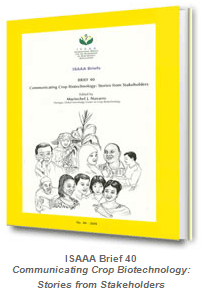Los Banos, The Philippines
July 17, 2009
 Science
communication plays an important role in promoting an open and
transparent debate about crop biotechnology. This debate
guarantees responsible use of the technology and assures
stakeholders of having a choice or say in its adoption.
Stakeholders or the so-called attentive publics are critically
involved in framing the debate, shaping policy, influencing
public opinion, and creating greater awareness and understanding
of biotechnology. Together these stakeholders such as farmers,
media practitioners, policy makers, scientists, academics,
religious leaders, and the industry sector determine the
direction and depth of the biotech debate, and ultimately the
acceptance, adoption, and sustainability of technology. Science
communication plays an important role in promoting an open and
transparent debate about crop biotechnology. This debate
guarantees responsible use of the technology and assures
stakeholders of having a choice or say in its adoption.
Stakeholders or the so-called attentive publics are critically
involved in framing the debate, shaping policy, influencing
public opinion, and creating greater awareness and understanding
of biotechnology. Together these stakeholders such as farmers,
media practitioners, policy makers, scientists, academics,
religious leaders, and the industry sector determine the
direction and depth of the biotech debate, and ultimately the
acceptance, adoption, and sustainability of technology.
The International Service for the
Acquisition of Agri-biotech Applications (ISAAA) has
released Brief 40 on Communicating Crop Biotechnology: Stories
from Stakeholders. It documents how various stakeholders have
benefited from science communication efforts and how in turn,
they are now part of the process of realizing a collective voice
on crop biotechnology. Stories from stakeholders in 14 countries
in Africa (Burkina Faso, Egypt, Ghana, Kenya, and Uganda) and
Asia (Bangladesh, China, India, Indonesia, Malaysia, Pakistan,
Philippines, Thailand, and Vietnam) as well as the global
community show that despite the differences in culture,
language, and geographical locations, they have similar
experiences, face common problems, and share a hope for
themselves and their family.
Stories are complemented by discussions on communication
strategies that were implemented and specific activities that
stakeholders participated in or use to better understand the
technology. These personal accounts unfolded distinct patterns
of experiences, perceptions, and behavior but converged to form
a common thread to show the impact of knowledge sharing
initiatives.
Download the Brief at
http://www.isaaa.org/resources/publications/briefs/40/ or
download the document by sections
|
|